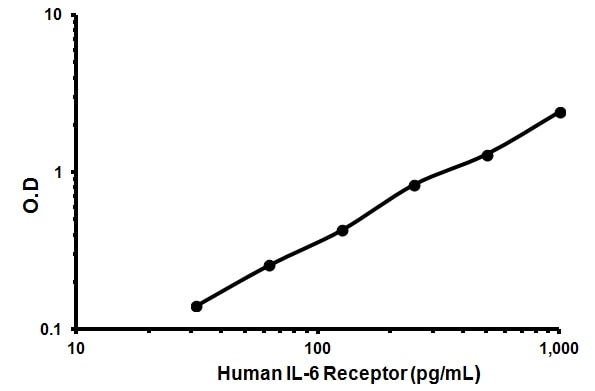Human IL-6 Receptor ELISA Kit (ab46029)
Key features and details
- Sensitivity: 5 pg/ml
- Range: 31.25 pg/ml - 1000 pg/ml
- Sample type: Cell culture supernatant, Plasma, Serum
- Detection method: Colorimetric
- Assay type: Sandwich (quantitative)
- Reacts with: Human
Properties
-
Storage instructions
Store at +4°C. Please refer to protocols. -
Components Identifier 1 x 96 tests 2 x 96 tests 10X Standard Diluent Buffer Black 1 x 15ml 1 x 25ml 200X Wash Buffer White 1 x 10ml 2 x 10ml Biotinylated Antibody Diluent Red 1 x 7ml 1 x 13ml Biotinylated anti-IL-6R (CD126) Red 1 x 0.4ml 2 x 0.4ml Chromogen TMB Substrate Solution 1 x 11ml 1 x 24ml HRP Diluent Red 1 x 12ml 1 x 23ml IL-6 Receptor Microplate (12 x 8 well strips) 1 unit 2 units IL-6R Control Silver 2 vials 4 vials IL-6R Standard Yellow 2 vials 4 vials Stop Reagent Black 1 x 11ml 2 x 11ml Streptavidin-HRP 2 x 5µl 4 x 5µl -
Research areas
-
Function
Part of the receptor for interleukin 6. Binds to IL6 with low affinity, but does not transduce a signal. Signal activation necessitate an association with IL6ST. Activation may lead to the regulation of the immune response, acute-phase reactions and hematopoiesis.
Low concentration of a soluble form of IL6 receptor acts as an agonist of IL6 activity. -
Tissue specificity
Isoform 2 is expressed in peripheral blood mononuclear cells and weakly found in urine and serum. -
Sequence similarities
Belongs to the type I cytokine receptor family. Type 3 subfamily.
Contains 1 fibronectin type-III domain.
Contains 1 Ig-like C2-type (immunoglobulin-like) domain. -
Domain
The two fibronectin type-III-like domains, contained in the N-terminal part, form together a cytokine-binding domain.
The WSXWS motif appears to be necessary for proper protein folding and thereby efficient intracellular transport and cell-surface receptor binding. -
Post-translational
modificationsA short soluble form may also be released from the membrane by proteolysis. -
Cellular localization
Secreted and Basolateral cell membrane. - Information by UniProt
-
Alternative names
- CD 126
- CD126
- CD126 antigen
see all -
Database links
- Entrez Gene: 3570 Human
- Omim: 147880 Human
- SwissProt: P08887 Human
- Unigene: 709210 Human
- Unigene: 135087 Human







